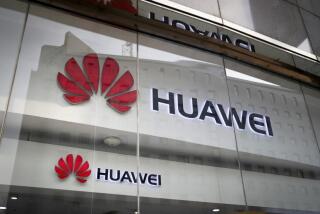IBM Expected to Announce Super-Chip Pact : Computers: It would unite technology powerhouses on three continents to develop 256-megabit memory chips.
- Share via
International Business Machines Corp. is expected to announce on Monday a major international alliance in advanced computer memory chips.
One industry source who asked not to be named said IBM would announce that it has reached an agreement with Siemens of Germany and Toshiba Corp. of Japan to develop memory chips that hold 256 megabits of information--64 times more data than that of the highest-capacity chips now on the market.
An agreement linking technology powerhouses from three continents would underscore the diminishing importance of national boundaries in an industry where new generations of products require billions of dollars in investment.
IBM said Friday it would hold a press conference Monday, but wouldn’t disclose the subject. Jack Kuehler, IBM president and chief technology officer, is expected to preside. The deal with Siemens and Toshiba could not be independently corroborated.
IBM already has an agreement with Siemens to jointly produce 16-megabit computer memory chips at a factory in France, as well as an agreement to design the following generation of chips, which hold 64 megabits of information. IBM also has deals with Toshiba to produce flat-panel computer displays and a type of memory chip known as flash memory.
Several sources said that IBM on Monday would announce only that it had reached agreement with Siemens to jointly produce the 64-megabit chips, most likely at IBM facilities in the United States. A Siemens official said several weeks ago that the company would not build its own 64-megabit factory.
One source said that Siemens officials had recently toured IBM’s advanced chip development facility in East Fishkill, N.Y., and its chip factory in Burlington, Vt. He said Siemens might even buy an interest in one or both facilities.
While production facilities for the current generation of 4-megabit chips cost several hundred million dollars, the 16-megabit factories are expected to cost nearly $1 billion. The 64-megabit factories--which will begin coming on line in the middle of the decade--will cost even more. Development and production of 256-megabit chips is expected to run into many billions of dollars.
Japanese chip makers drove most American vendors out of the mass-market memory chip business in the mid-1980s, but IBM has retained a leadership role in advanced memory chip technology. Higher-capacity memory chips allow computer vendors to build smaller, cheaper and more powerful computers.
Memory chips are especially important to the chip industry because they are the largest single product category and because they serve as a proving ground for the most advanced chip production technologies.
IBM and Siemens announced in December that they had successfully built a prototype 64-megabit chip, the first companies to do so. All the major Japanese chip manufacturers are also gearing up for the 64-megabit chips.






